PPMP20015: Cost Forecasting Challenges in Large Projects
VerifiedAdded on 2023/06/10
|7
|1856
|225
Report
AI Summary
This report, prepared for the PPMP20015 Research in Project Management course, critically reviews the challenges of cost forecasting in the context of large projects, particularly in the construction industry. The report begins with an overview of the importance of time and cost control in project management, highlighting the frequent failures of UK construction projects to meet objectives despite the availability of project control techniques. It analyzes various factors inhibiting time and cost control, such as design changes, risks, and inaccurate time evaluations, drawing on a survey of 250 projects and semi-structured interviews. The report examines the significance of internal project elements over external factors and the need for customizable models to provide a skeletal structure for projects. It also includes preliminary research questions and a reflection on the need for specific methodologies tailored to large projects. The report incorporates a literature review, questionnaire survey, and interviews, and it suggests mitigating measures and practical strategies to improve cost control. The report also includes a similarity report, personal reflection, conclusion, and a list of references, providing a comprehensive analysis of the topic.
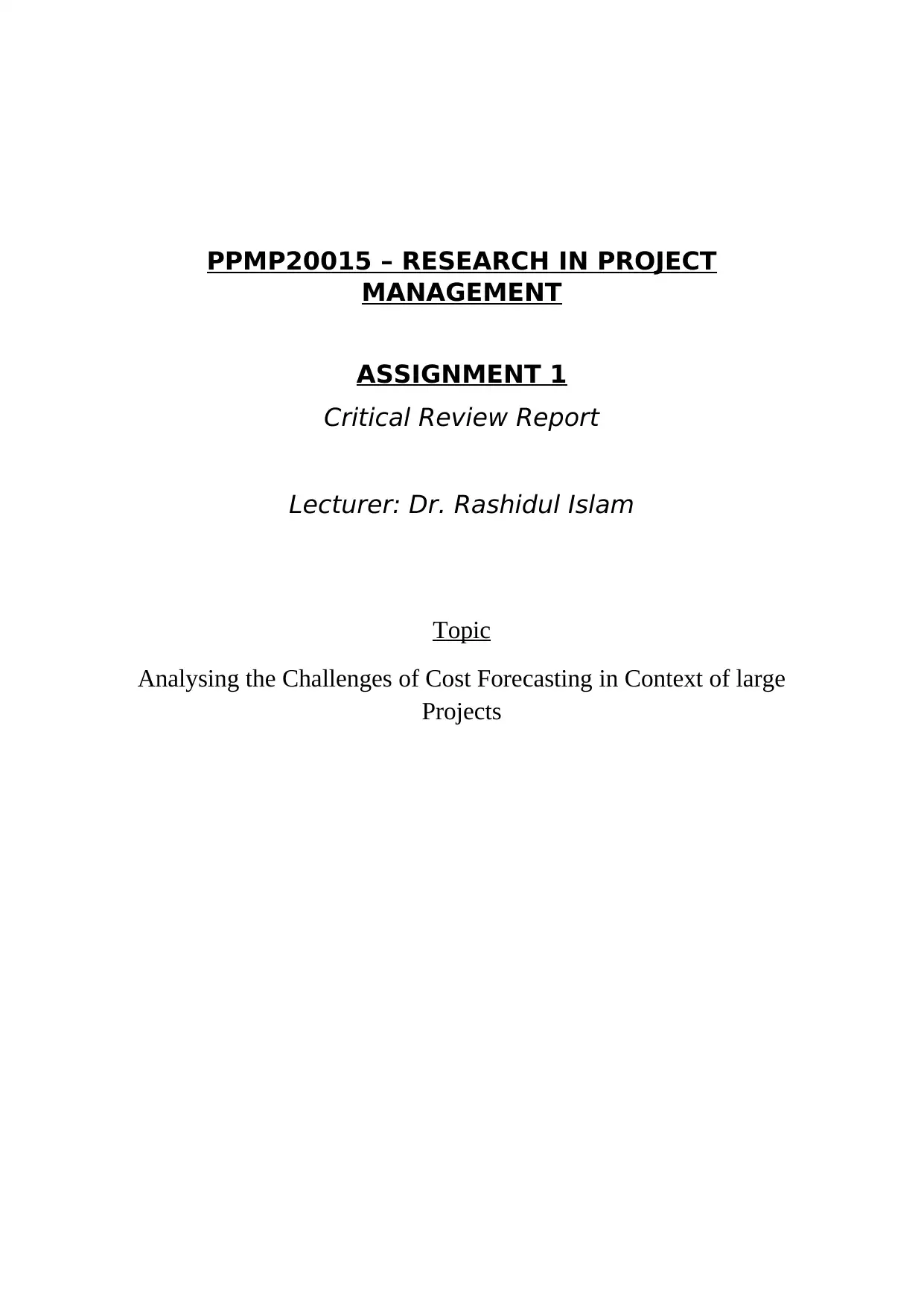
PPMP20015 – RESEARCH IN PROJECT
MANAGEMENT
ASSIGNMENT 1
Critical Review Report
Lecturer: Dr. Rashidul Islam
Topic
Analysing the Challenges of Cost Forecasting in Context of large
Projects
MANAGEMENT
ASSIGNMENT 1
Critical Review Report
Lecturer: Dr. Rashidul Islam
Topic
Analysing the Challenges of Cost Forecasting in Context of large
Projects
Paraphrase This Document
Need a fresh take? Get an instant paraphrase of this document with our AI Paraphraser
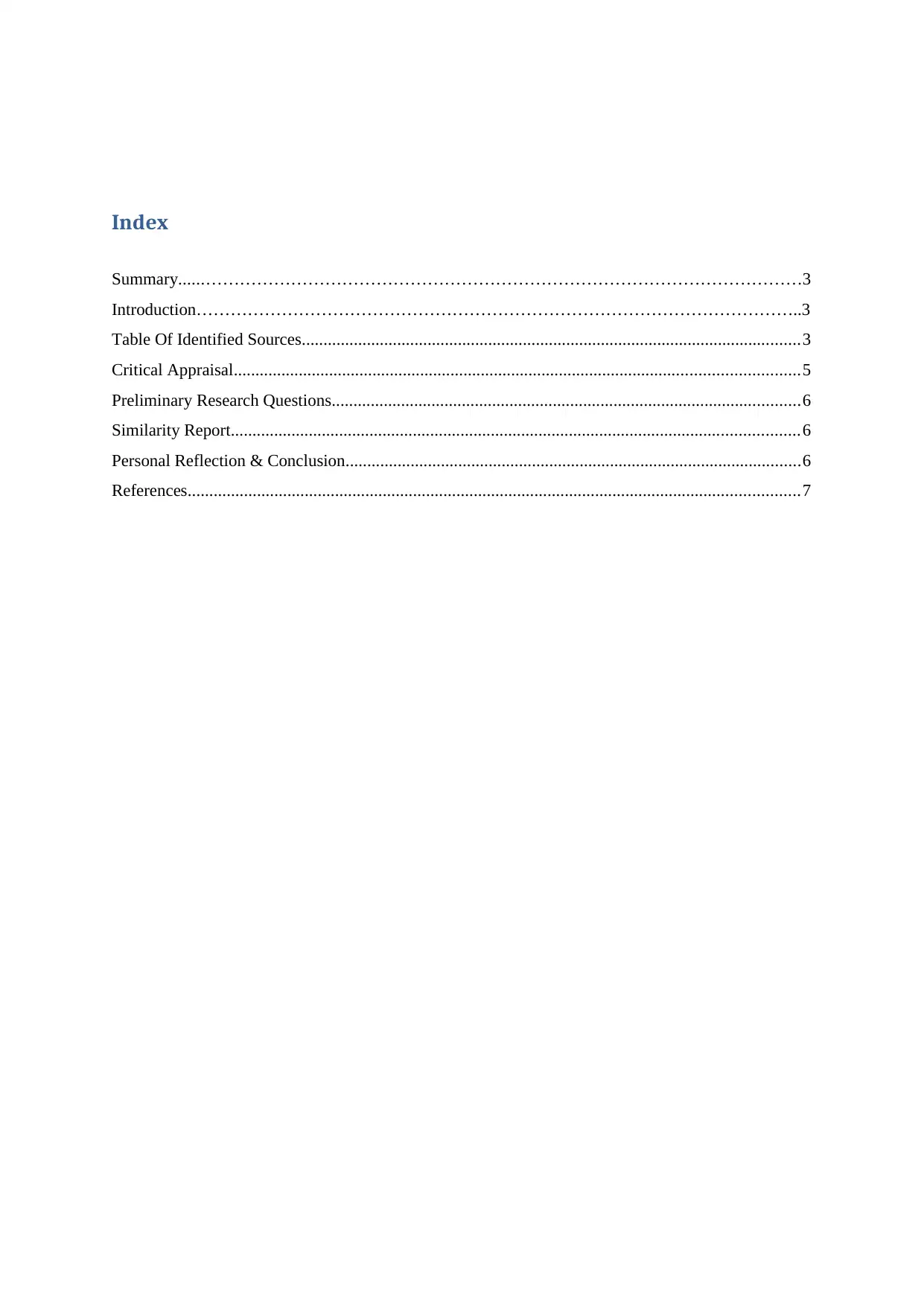
Index
Summary......……………………………………………………………………………………………3
Introduction……………………………………………………………………………………………..3
Table Of Identified Sources...................................................................................................................3
Critical Appraisal..................................................................................................................................5
Preliminary Research Questions............................................................................................................6
Similarity Report...................................................................................................................................6
Personal Reflection & Conclusion.........................................................................................................6
References.............................................................................................................................................7
Summary......……………………………………………………………………………………………3
Introduction……………………………………………………………………………………………..3
Table Of Identified Sources...................................................................................................................3
Critical Appraisal..................................................................................................................................5
Preliminary Research Questions............................................................................................................6
Similarity Report...................................................................................................................................6
Personal Reflection & Conclusion.........................................................................................................6
References.............................................................................................................................................7
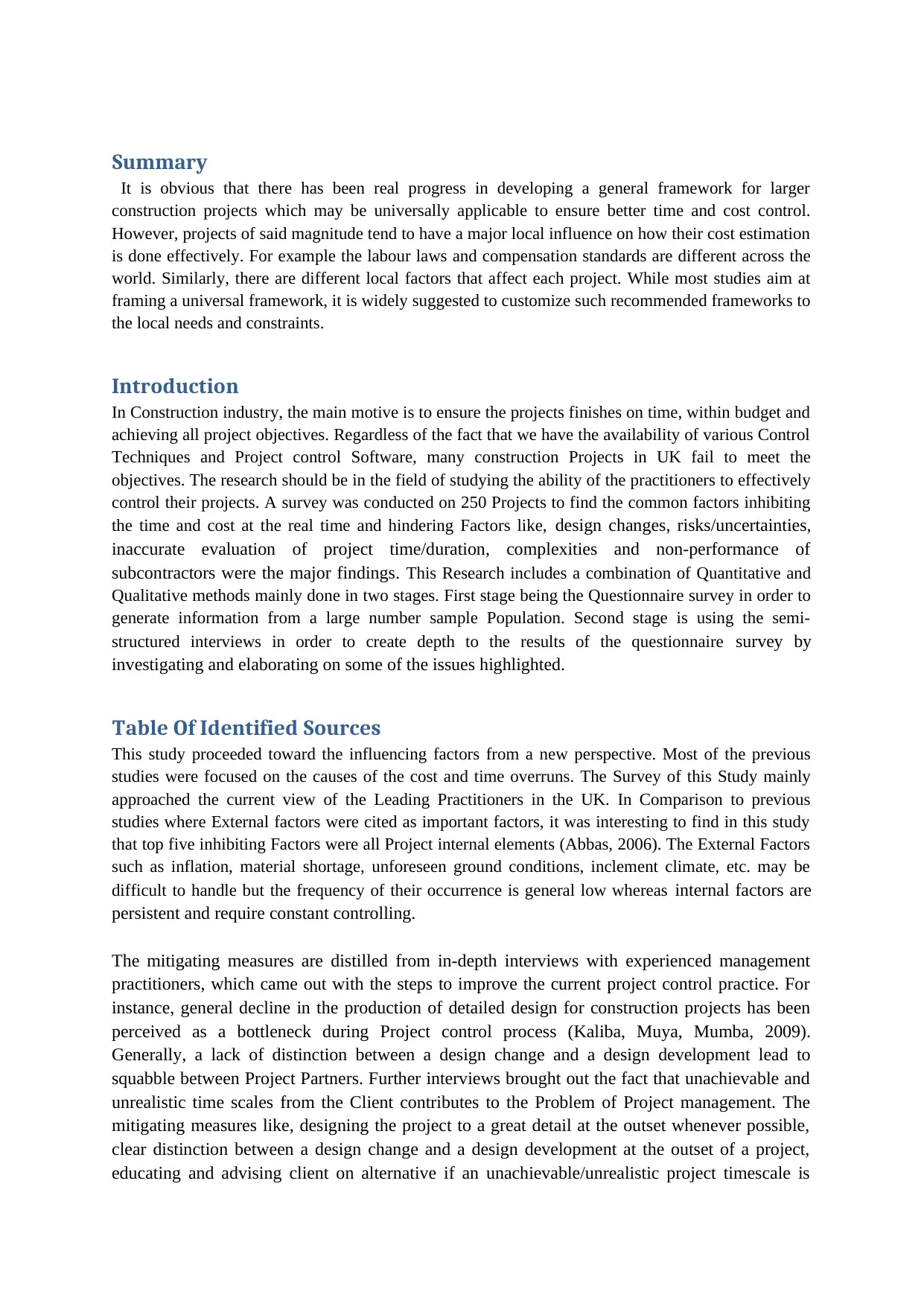
Summary
It is obvious that there has been real progress in developing a general framework for larger
construction projects which may be universally applicable to ensure better time and cost control.
However, projects of said magnitude tend to have a major local influence on how their cost estimation
is done effectively. For example the labour laws and compensation standards are different across the
world. Similarly, there are different local factors that affect each project. While most studies aim at
framing a universal framework, it is widely suggested to customize such recommended frameworks to
the local needs and constraints.
Introduction
In Construction industry, the main motive is to ensure the projects finishes on time, within budget and
achieving all project objectives. Regardless of the fact that we have the availability of various Control
Techniques and Project control Software, many construction Projects in UK fail to meet the
objectives. The research should be in the field of studying the ability of the practitioners to effectively
control their projects. A survey was conducted on 250 Projects to find the common factors inhibiting
the time and cost at the real time and hindering Factors like, design changes, risks/uncertainties,
inaccurate evaluation of project time/duration, complexities and non-performance of
subcontractors were the major findings. This Research includes a combination of Quantitative and
Qualitative methods mainly done in two stages. First stage being the Questionnaire survey in order to
generate information from a large number sample Population. Second stage is using the semi-
structured interviews in order to create depth to the results of the questionnaire survey by
investigating and elaborating on some of the issues highlighted.
Table Of Identified Sources
This study proceeded toward the influencing factors from a new perspective. Most of the previous
studies were focused on the causes of the cost and time overruns. The Survey of this Study mainly
approached the current view of the Leading Practitioners in the UK. In Comparison to previous
studies where External factors were cited as important factors, it was interesting to find in this study
that top five inhibiting Factors were all Project internal elements (Abbas, 2006). The External Factors
such as inflation, material shortage, unforeseen ground conditions, inclement climate, etc. may be
difficult to handle but the frequency of their occurrence is general low whereas internal factors are
persistent and require constant controlling.
The mitigating measures are distilled from in-depth interviews with experienced management
practitioners, which came out with the steps to improve the current project control practice. For
instance, general decline in the production of detailed design for construction projects has been
perceived as a bottleneck during Project control process (Kaliba, Muya, Mumba, 2009).
Generally, a lack of distinction between a design change and a design development lead to
squabble between Project Partners. Further interviews brought out the fact that unachievable and
unrealistic time scales from the Client contributes to the Problem of Project management. The
mitigating measures like, designing the project to a great detail at the outset whenever possible,
clear distinction between a design change and a design development at the outset of a project,
educating and advising client on alternative if an unachievable/unrealistic project timescale is
It is obvious that there has been real progress in developing a general framework for larger
construction projects which may be universally applicable to ensure better time and cost control.
However, projects of said magnitude tend to have a major local influence on how their cost estimation
is done effectively. For example the labour laws and compensation standards are different across the
world. Similarly, there are different local factors that affect each project. While most studies aim at
framing a universal framework, it is widely suggested to customize such recommended frameworks to
the local needs and constraints.
Introduction
In Construction industry, the main motive is to ensure the projects finishes on time, within budget and
achieving all project objectives. Regardless of the fact that we have the availability of various Control
Techniques and Project control Software, many construction Projects in UK fail to meet the
objectives. The research should be in the field of studying the ability of the practitioners to effectively
control their projects. A survey was conducted on 250 Projects to find the common factors inhibiting
the time and cost at the real time and hindering Factors like, design changes, risks/uncertainties,
inaccurate evaluation of project time/duration, complexities and non-performance of
subcontractors were the major findings. This Research includes a combination of Quantitative and
Qualitative methods mainly done in two stages. First stage being the Questionnaire survey in order to
generate information from a large number sample Population. Second stage is using the semi-
structured interviews in order to create depth to the results of the questionnaire survey by
investigating and elaborating on some of the issues highlighted.
Table Of Identified Sources
This study proceeded toward the influencing factors from a new perspective. Most of the previous
studies were focused on the causes of the cost and time overruns. The Survey of this Study mainly
approached the current view of the Leading Practitioners in the UK. In Comparison to previous
studies where External factors were cited as important factors, it was interesting to find in this study
that top five inhibiting Factors were all Project internal elements (Abbas, 2006). The External Factors
such as inflation, material shortage, unforeseen ground conditions, inclement climate, etc. may be
difficult to handle but the frequency of their occurrence is general low whereas internal factors are
persistent and require constant controlling.
The mitigating measures are distilled from in-depth interviews with experienced management
practitioners, which came out with the steps to improve the current project control practice. For
instance, general decline in the production of detailed design for construction projects has been
perceived as a bottleneck during Project control process (Kaliba, Muya, Mumba, 2009).
Generally, a lack of distinction between a design change and a design development lead to
squabble between Project Partners. Further interviews brought out the fact that unachievable and
unrealistic time scales from the Client contributes to the Problem of Project management. The
mitigating measures like, designing the project to a great detail at the outset whenever possible,
clear distinction between a design change and a design development at the outset of a project,
educating and advising client on alternative if an unachievable/unrealistic project timescale is
⊘ This is a preview!⊘
Do you want full access?
Subscribe today to unlock all pages.

Trusted by 1+ million students worldwide
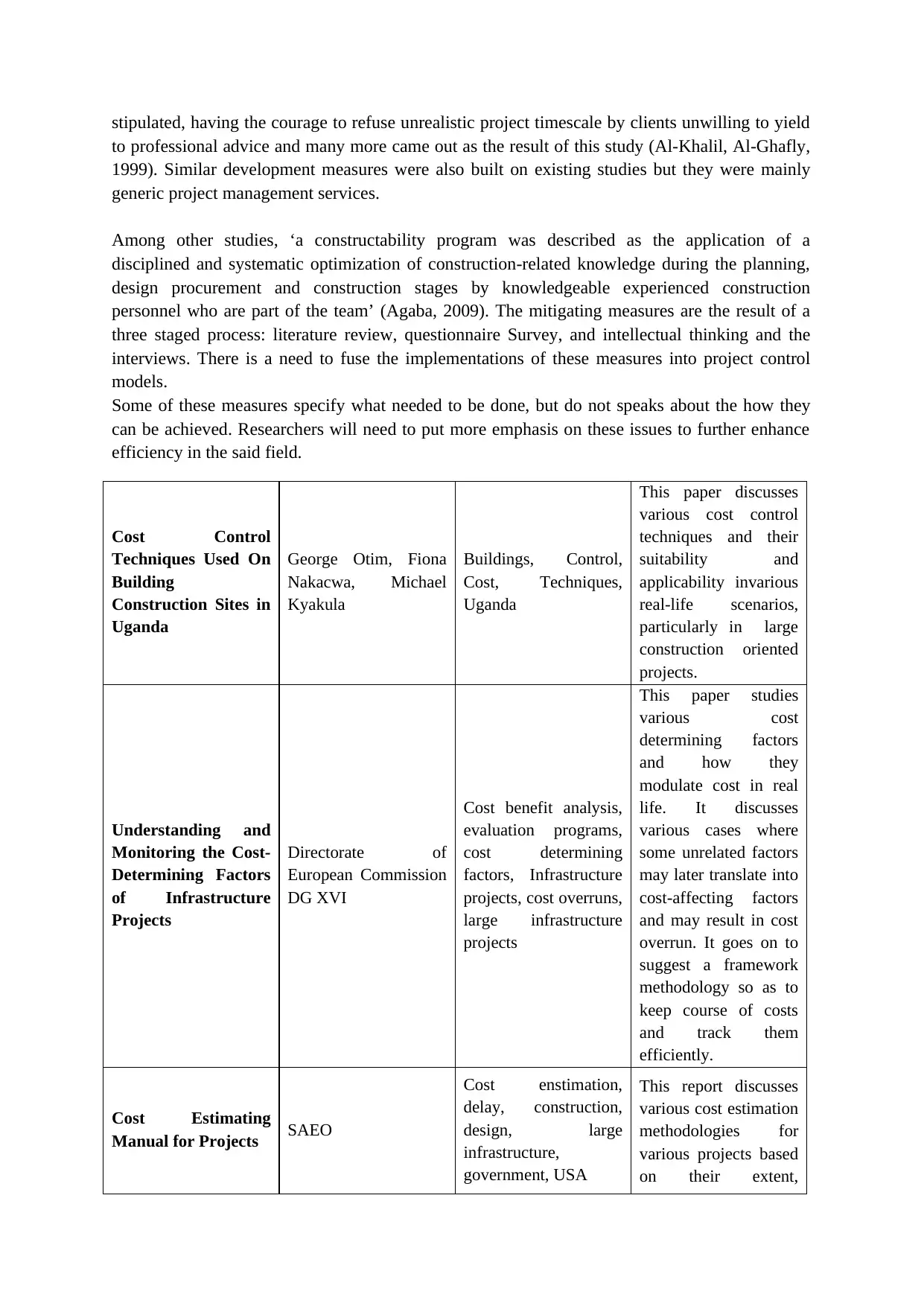
stipulated, having the courage to refuse unrealistic project timescale by clients unwilling to yield
to professional advice and many more came out as the result of this study (Al-Khalil, Al-Ghafly,
1999). Similar development measures were also built on existing studies but they were mainly
generic project management services.
Among other studies, ‘a constructability program was described as the application of a
disciplined and systematic optimization of construction-related knowledge during the planning,
design procurement and construction stages by knowledgeable experienced construction
personnel who are part of the team’ (Agaba, 2009). The mitigating measures are the result of a
three staged process: literature review, questionnaire Survey, and intellectual thinking and the
interviews. There is a need to fuse the implementations of these measures into project control
models.
Some of these measures specify what needed to be done, but do not speaks about the how they
can be achieved. Researchers will need to put more emphasis on these issues to further enhance
efficiency in the said field.
Cost Control
Techniques Used On
Building
Construction Sites in
Uganda
George Otim, Fiona
Nakacwa, Michael
Kyakula
Buildings, Control,
Cost, Techniques,
Uganda
This paper discusses
various cost control
techniques and their
suitability and
applicability invarious
real-life scenarios,
particularly in large
construction oriented
projects.
Understanding and
Monitoring the Cost-
Determining Factors
of Infrastructure
Projects
Directorate of
European Commission
DG XVI
Cost benefit analysis,
evaluation programs,
cost determining
factors, Infrastructure
projects, cost overruns,
large infrastructure
projects
This paper studies
various cost
determining factors
and how they
modulate cost in real
life. It discusses
various cases where
some unrelated factors
may later translate into
cost-affecting factors
and may result in cost
overrun. It goes on to
suggest a framework
methodology so as to
keep course of costs
and track them
efficiently.
Cost Estimating
Manual for Projects SAEO
Cost enstimation,
delay, construction,
design, large
infrastructure,
government, USA
This report discusses
various cost estimation
methodologies for
various projects based
on their extent,
to professional advice and many more came out as the result of this study (Al-Khalil, Al-Ghafly,
1999). Similar development measures were also built on existing studies but they were mainly
generic project management services.
Among other studies, ‘a constructability program was described as the application of a
disciplined and systematic optimization of construction-related knowledge during the planning,
design procurement and construction stages by knowledgeable experienced construction
personnel who are part of the team’ (Agaba, 2009). The mitigating measures are the result of a
three staged process: literature review, questionnaire Survey, and intellectual thinking and the
interviews. There is a need to fuse the implementations of these measures into project control
models.
Some of these measures specify what needed to be done, but do not speaks about the how they
can be achieved. Researchers will need to put more emphasis on these issues to further enhance
efficiency in the said field.
Cost Control
Techniques Used On
Building
Construction Sites in
Uganda
George Otim, Fiona
Nakacwa, Michael
Kyakula
Buildings, Control,
Cost, Techniques,
Uganda
This paper discusses
various cost control
techniques and their
suitability and
applicability invarious
real-life scenarios,
particularly in large
construction oriented
projects.
Understanding and
Monitoring the Cost-
Determining Factors
of Infrastructure
Projects
Directorate of
European Commission
DG XVI
Cost benefit analysis,
evaluation programs,
cost determining
factors, Infrastructure
projects, cost overruns,
large infrastructure
projects
This paper studies
various cost
determining factors
and how they
modulate cost in real
life. It discusses
various cases where
some unrelated factors
may later translate into
cost-affecting factors
and may result in cost
overrun. It goes on to
suggest a framework
methodology so as to
keep course of costs
and track them
efficiently.
Cost Estimating
Manual for Projects SAEO
Cost enstimation,
delay, construction,
design, large
infrastructure,
government, USA
This report discusses
various cost estimation
methodologies for
various projects based
on their extent,
Paraphrase This Document
Need a fresh take? Get an instant paraphrase of this document with our AI Paraphraser
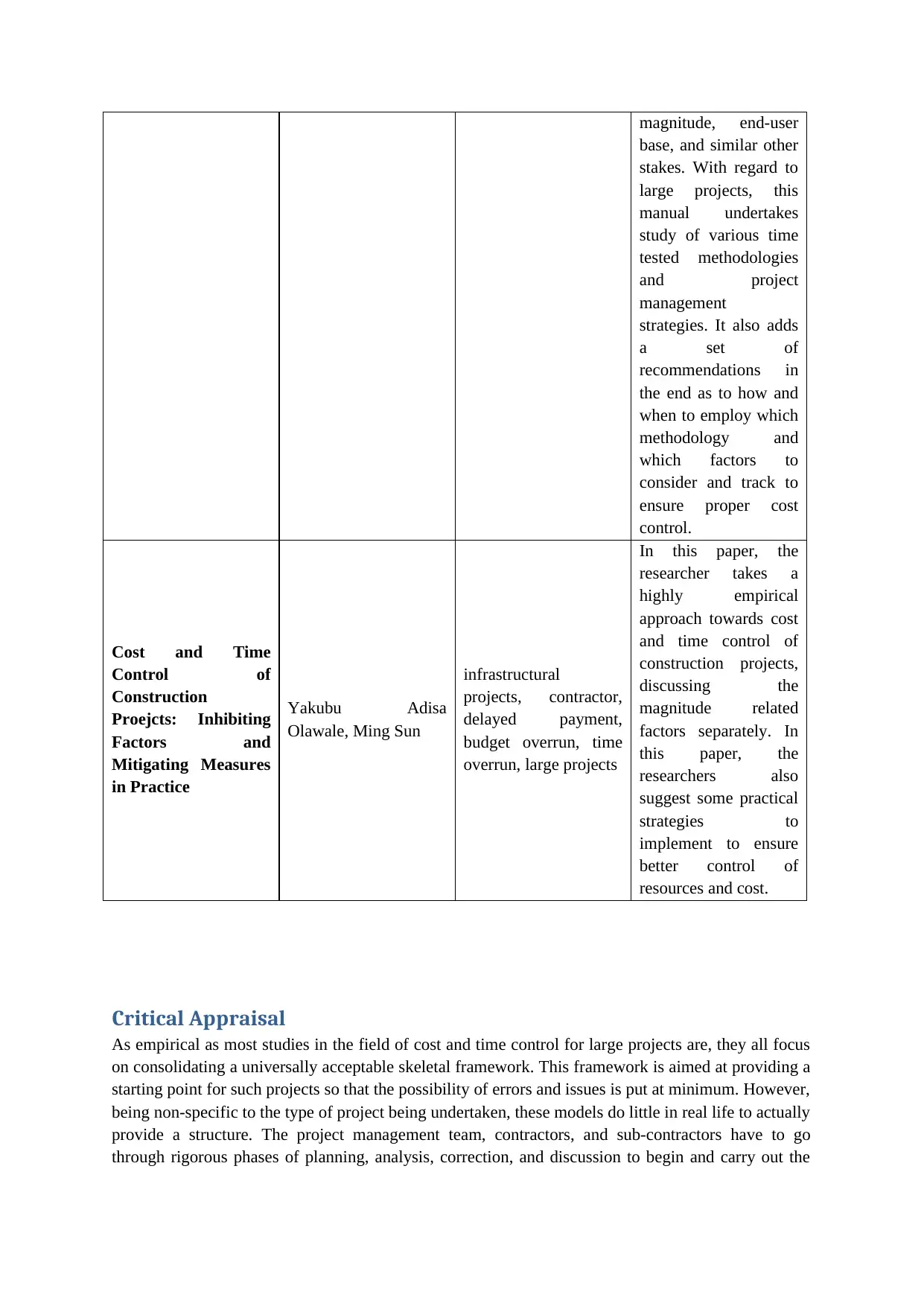
magnitude, end-user
base, and similar other
stakes. With regard to
large projects, this
manual undertakes
study of various time
tested methodologies
and project
management
strategies. It also adds
a set of
recommendations in
the end as to how and
when to employ which
methodology and
which factors to
consider and track to
ensure proper cost
control.
Cost and Time
Control of
Construction
Proejcts: Inhibiting
Factors and
Mitigating Measures
in Practice
Yakubu Adisa
Olawale, Ming Sun
infrastructural
projects, contractor,
delayed payment,
budget overrun, time
overrun, large projects
In this paper, the
researcher takes a
highly empirical
approach towards cost
and time control of
construction projects,
discussing the
magnitude related
factors separately. In
this paper, the
researchers also
suggest some practical
strategies to
implement to ensure
better control of
resources and cost.
Critical Appraisal
As empirical as most studies in the field of cost and time control for large projects are, they all focus
on consolidating a universally acceptable skeletal framework. This framework is aimed at providing a
starting point for such projects so that the possibility of errors and issues is put at minimum. However,
being non-specific to the type of project being undertaken, these models do little in real life to actually
provide a structure. The project management team, contractors, and sub-contractors have to go
through rigorous phases of planning, analysis, correction, and discussion to begin and carry out the
base, and similar other
stakes. With regard to
large projects, this
manual undertakes
study of various time
tested methodologies
and project
management
strategies. It also adds
a set of
recommendations in
the end as to how and
when to employ which
methodology and
which factors to
consider and track to
ensure proper cost
control.
Cost and Time
Control of
Construction
Proejcts: Inhibiting
Factors and
Mitigating Measures
in Practice
Yakubu Adisa
Olawale, Ming Sun
infrastructural
projects, contractor,
delayed payment,
budget overrun, time
overrun, large projects
In this paper, the
researcher takes a
highly empirical
approach towards cost
and time control of
construction projects,
discussing the
magnitude related
factors separately. In
this paper, the
researchers also
suggest some practical
strategies to
implement to ensure
better control of
resources and cost.
Critical Appraisal
As empirical as most studies in the field of cost and time control for large projects are, they all focus
on consolidating a universally acceptable skeletal framework. This framework is aimed at providing a
starting point for such projects so that the possibility of errors and issues is put at minimum. However,
being non-specific to the type of project being undertaken, these models do little in real life to actually
provide a structure. The project management team, contractors, and sub-contractors have to go
through rigorous phases of planning, analysis, correction, and discussion to begin and carry out the
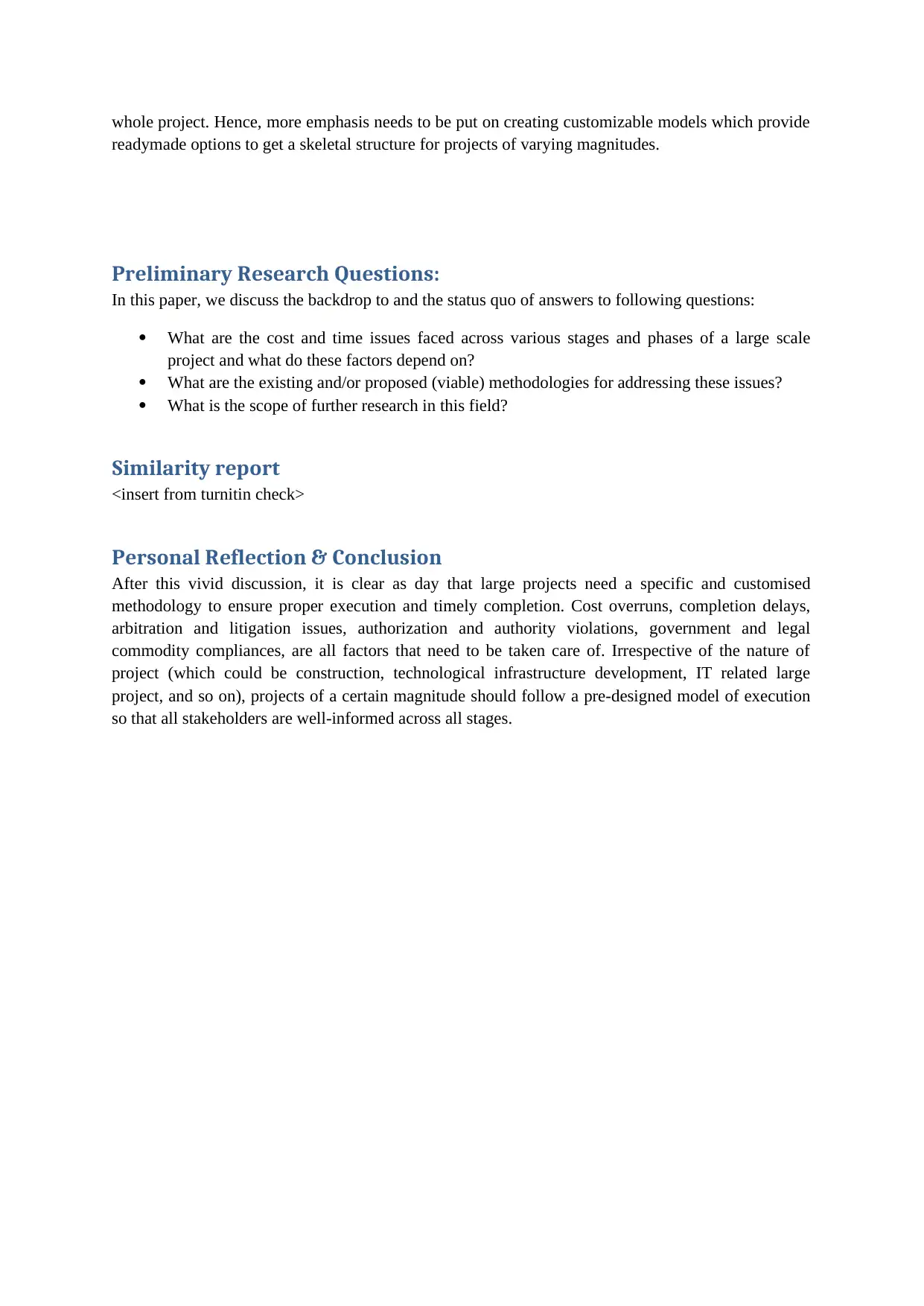
whole project. Hence, more emphasis needs to be put on creating customizable models which provide
readymade options to get a skeletal structure for projects of varying magnitudes.
Preliminary Research Questions:
In this paper, we discuss the backdrop to and the status quo of answers to following questions:
What are the cost and time issues faced across various stages and phases of a large scale
project and what do these factors depend on?
What are the existing and/or proposed (viable) methodologies for addressing these issues?
What is the scope of further research in this field?
Similarity report
<insert from turnitin check>
Personal Reflection & Conclusion
After this vivid discussion, it is clear as day that large projects need a specific and customised
methodology to ensure proper execution and timely completion. Cost overruns, completion delays,
arbitration and litigation issues, authorization and authority violations, government and legal
commodity compliances, are all factors that need to be taken care of. Irrespective of the nature of
project (which could be construction, technological infrastructure development, IT related large
project, and so on), projects of a certain magnitude should follow a pre-designed model of execution
so that all stakeholders are well-informed across all stages.
readymade options to get a skeletal structure for projects of varying magnitudes.
Preliminary Research Questions:
In this paper, we discuss the backdrop to and the status quo of answers to following questions:
What are the cost and time issues faced across various stages and phases of a large scale
project and what do these factors depend on?
What are the existing and/or proposed (viable) methodologies for addressing these issues?
What is the scope of further research in this field?
Similarity report
<insert from turnitin check>
Personal Reflection & Conclusion
After this vivid discussion, it is clear as day that large projects need a specific and customised
methodology to ensure proper execution and timely completion. Cost overruns, completion delays,
arbitration and litigation issues, authorization and authority violations, government and legal
commodity compliances, are all factors that need to be taken care of. Irrespective of the nature of
project (which could be construction, technological infrastructure development, IT related large
project, and so on), projects of a certain magnitude should follow a pre-designed model of execution
so that all stakeholders are well-informed across all stages.
⊘ This is a preview!⊘
Do you want full access?
Subscribe today to unlock all pages.

Trusted by 1+ million students worldwide
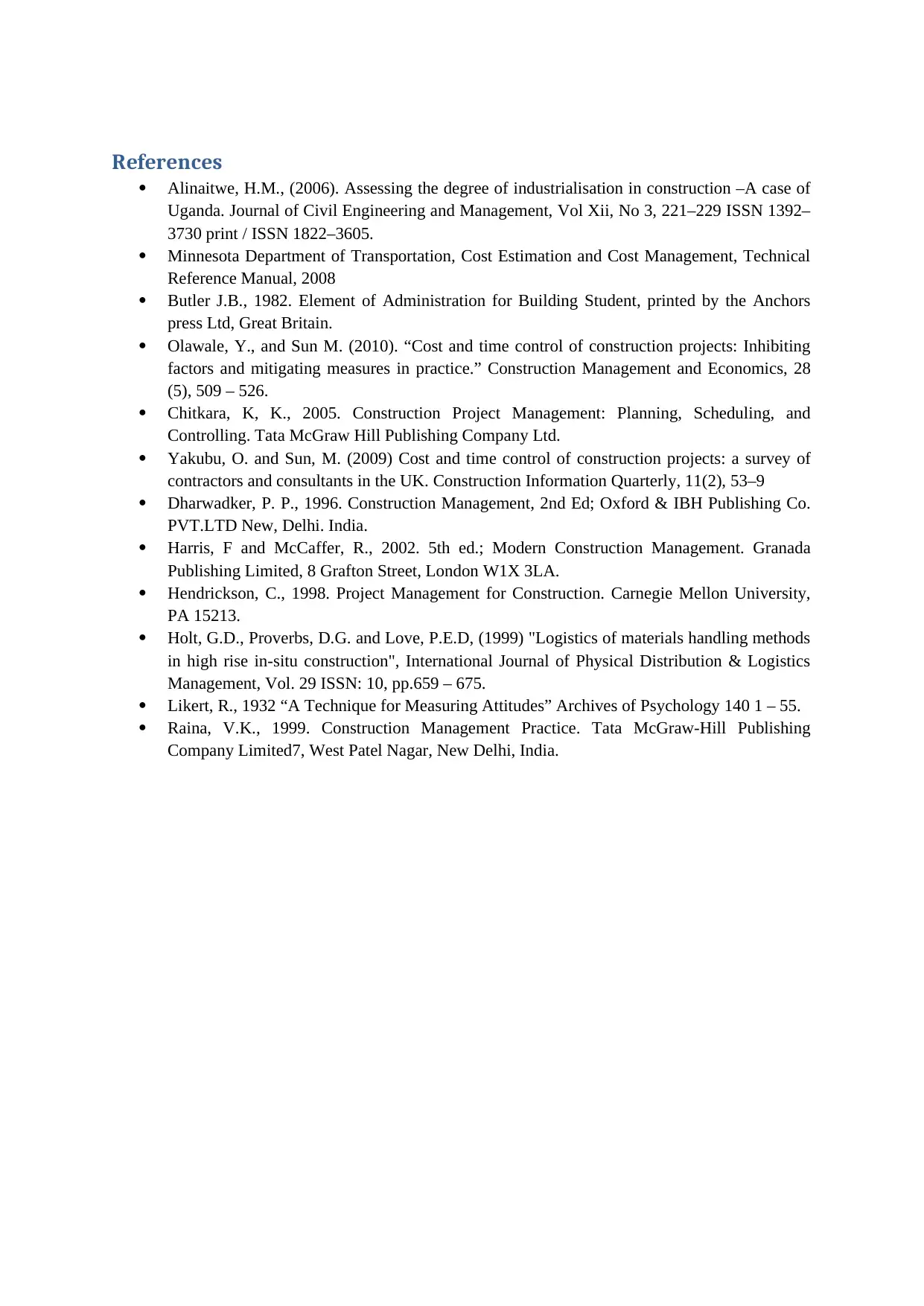
References
Alinaitwe, H.M., (2006). Assessing the degree of industrialisation in construction –A case of
Uganda. Journal of Civil Engineering and Management, Vol Xii, No 3, 221–229 ISSN 1392–
3730 print / ISSN 1822–3605.
Minnesota Department of Transportation, Cost Estimation and Cost Management, Technical
Reference Manual, 2008
Butler J.B., 1982. Element of Administration for Building Student, printed by the Anchors
press Ltd, Great Britain.
Olawale, Y., and Sun M. (2010). “Cost and time control of construction projects: Inhibiting
factors and mitigating measures in practice.” Construction Management and Economics, 28
(5), 509 – 526.
Chitkara, K, K., 2005. Construction Project Management: Planning, Scheduling, and
Controlling. Tata McGraw Hill Publishing Company Ltd.
Yakubu, O. and Sun, M. (2009) Cost and time control of construction projects: a survey of
contractors and consultants in the UK. Construction Information Quarterly, 11(2), 53–9
Dharwadker, P. P., 1996. Construction Management, 2nd Ed; Oxford & IBH Publishing Co.
PVT.LTD New, Delhi. India.
Harris, F and McCaffer, R., 2002. 5th ed.; Modern Construction Management. Granada
Publishing Limited, 8 Grafton Street, London W1X 3LA.
Hendrickson, C., 1998. Project Management for Construction. Carnegie Mellon University,
PA 15213.
Holt, G.D., Proverbs, D.G. and Love, P.E.D, (1999) "Logistics of materials handling methods
in high rise in-situ construction", International Journal of Physical Distribution & Logistics
Management, Vol. 29 ISSN: 10, pp.659 – 675.
Likert, R., 1932 “A Technique for Measuring Attitudes” Archives of Psychology 140 1 – 55.
Raina, V.K., 1999. Construction Management Practice. Tata McGraw-Hill Publishing
Company Limited7, West Patel Nagar, New Delhi, India.
Alinaitwe, H.M., (2006). Assessing the degree of industrialisation in construction –A case of
Uganda. Journal of Civil Engineering and Management, Vol Xii, No 3, 221–229 ISSN 1392–
3730 print / ISSN 1822–3605.
Minnesota Department of Transportation, Cost Estimation and Cost Management, Technical
Reference Manual, 2008
Butler J.B., 1982. Element of Administration for Building Student, printed by the Anchors
press Ltd, Great Britain.
Olawale, Y., and Sun M. (2010). “Cost and time control of construction projects: Inhibiting
factors and mitigating measures in practice.” Construction Management and Economics, 28
(5), 509 – 526.
Chitkara, K, K., 2005. Construction Project Management: Planning, Scheduling, and
Controlling. Tata McGraw Hill Publishing Company Ltd.
Yakubu, O. and Sun, M. (2009) Cost and time control of construction projects: a survey of
contractors and consultants in the UK. Construction Information Quarterly, 11(2), 53–9
Dharwadker, P. P., 1996. Construction Management, 2nd Ed; Oxford & IBH Publishing Co.
PVT.LTD New, Delhi. India.
Harris, F and McCaffer, R., 2002. 5th ed.; Modern Construction Management. Granada
Publishing Limited, 8 Grafton Street, London W1X 3LA.
Hendrickson, C., 1998. Project Management for Construction. Carnegie Mellon University,
PA 15213.
Holt, G.D., Proverbs, D.G. and Love, P.E.D, (1999) "Logistics of materials handling methods
in high rise in-situ construction", International Journal of Physical Distribution & Logistics
Management, Vol. 29 ISSN: 10, pp.659 – 675.
Likert, R., 1932 “A Technique for Measuring Attitudes” Archives of Psychology 140 1 – 55.
Raina, V.K., 1999. Construction Management Practice. Tata McGraw-Hill Publishing
Company Limited7, West Patel Nagar, New Delhi, India.
1 out of 7
Related Documents
Your All-in-One AI-Powered Toolkit for Academic Success.
+13062052269
info@desklib.com
Available 24*7 on WhatsApp / Email
![[object Object]](/_next/static/media/star-bottom.7253800d.svg)
Unlock your academic potential
© 2024 | Zucol Services PVT LTD | All rights reserved.




